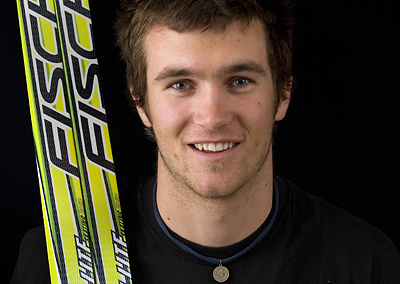
Feeding the Bobcat

All-American Nordic skier Sylvan Ellefson '09 wears a St. Christopher medal for a bit of good luck to complement a rigorous training regimen.
While Sylvan Ellefson ’09 hasn’t banished sweets or Commons crispitos from his diet, he’s honed an understanding of what his body needs to perform at peak level.
“I was definitely not conscious of eating a balanced diet my first year here,” says Ellefson, a Nordic skier from Vail, Colo., who won All-America honors at last year’s NCAA Skiing Championships. “But in the past two years I’ve really realized what it means.”
Now, he and his teammates consider Bates Dining Services to be part of their team. “Commons does a great job of providing us with the food we need for how we train,” Ellefson says.
For example, when the Nordic team travels during carnival season, their van carries Commons-provided food like granola, breads, fruits, and yogurt. Not for the skiers’ major meals — they get meal money for that — but for quick post-race nutrition. “Your body recovers more quickly if you get food right after a race,” explains Sam Evans-Brown ’09, Ellefson’s teammate.
When it comes to establishing healthy food routines, the teammates support each other, says head coach Becky Flynn Woods ’89. “It’s about getting into the right habit. For example, the skiers racing later in the day will take time in the morning to prepare food, like PB&Js, for everyone to eat right after the races.”
These days, the Nordic team’s training is especially motivated, what with Bates hosting this season’s NCAA Championships, March 11–14. For Ellefson, a Colorado-raised skier not recruited by any Division I schools out West, his competitive cup runneth over. “I’m proud to race as a Bobcat,” he says. “I love it in Maine.”
An alpine enthusiast growing up, Ellefson and his Vail Mountain School soccer buddies took up cross-country skiing to stay in shape during the winter. As a high school sophomore, he won skimeister as the best performer in Nordic and alpine events. By then, he knew his forte was Nordic so he dropped alpine, comparing it to choosing soccer over baseball when, as a little kid, he “couldn’t hit the ball off the tee.” But as a relative latecomer to Nordic skiing, Ellefson came East for college when Division I schools passed him up.
Highly competitive by nature, Ellefson describes his mother, Tashina, as a “tremendous” athlete. His late father, Lyndon, who helped found the sport of skyrunning — high-altitude, long-distance running — died in 1998 when, on a training run near Cervinia, Italy, he fell into a hidden snow crevasse, dropping 75 feet to his death.
Sylvan Ellefson is well-aware of his father’s reputation as a highly motivated competitor who pushed himself hard. “I feel that if I can do something really well, I can carry on his legacy,” he says. “In my case that’s Nordic skiing.” Looking ahead to his post-Bates racing career, he wants to “get to that level,” referencing the accomplishments of Nordic alums like Justin Freeman ’98, a 2006 U.S. Olympian, “and then do better.”
Ellefson’s specialty is freestyle, like skating on skis, and he earned trips to the NCAA Championships in both 2006 and 2007. Last year was a breakthrough season, as he won freestyle races at the season-ending carnivals at Williams and Middlebury, the first-ever wins for a Bates Nordic skier on the Eastern Collegiate Skiing Association circuit. At the 2008 NCAA Championships, Ellefson finished fourth in the 10K freestyle, one of only three Americans, and the only Division III skier, in the top 10.
While Ellefson targets another top-five finish, teammate Evans-Brown, a Spanish major from Gilmanton Iron Works, N.H., is so eager to qualify for his first NCAAs that he spent last summer in Argentina, living with a government official who’s a cross-country enthusiast, so he could train on snow. “I had easy access to skiing and was well-fed,” he says. “Lots of meat, for breakfast, lunch, snacks.”
There, he earned a reputation as “the kid who always eats,” and Evans-Brown estimates that he and Ellefson will take in 6,000 to 9,000 calories a day while training hard. That’s more than triple the typical daily diet of 2,500 calories — if not quite the famous 12,000-a-day regimen of Olympic swimmer Michael Phelps.
While the Nordic team tends to frequent Italian restaurants on the road for a good balance between protein and carbs, “what you eat right before a race is not so important, I think,” Evans-Brown says. What’s critical is “fueling yourself well while you’re training.”
At a recent campus meal, Ellefson and Evans-Brown are joined by Nicole Ritchie ’09 of East Dummerston, Vt. Twice an All-American rower as well as a skier, she has begun to avoid processed food. “A friend is doing a thesis that focuses on corn syrup,” she says. “I’ve been reading over her shoulder. The amount of energy going into producing corn syrup is pretty disgusting.”
In the new dining Commons, Ritchie gravitates toward local products: apple cider from Greenwood Orchards, chocolate milk from Oakhurst Dairy, and hamburgers from grass-fed, Cold Spring Ranch beef (see page 16) for her training fuels. She also frequents the vegan bar.
“Making your own food choices takes a lot of different economic and environmental issues into your hands,” says Ritchie. “It’s really cool that Commons supports us in making these decisions.”
By Andy Walter, photograph By Phyllis Graber Jensen

